Catholic Medical Quarterly Volume 64(2) May 2014
Correspondence
Conscience
Dr Michael Jarmulowicz
 Sir,
Sir,
James Flood has written about his opinion of conscience (Letters, Feb 2014) and has asked us what we think. So here is my response to his challenge.
My understanding of his rejection of the fundamental premise of Fr Crean’s article on conscience (CMQ Nov 2013) is on the basis that it presumes the church is infallible; he states that ‘Sadly we are all fallible (including the Church – Pope, Cardinals, Bishops etc)’. I take issue with him here. Hopefully we all believe that Jesus is God, and therefore as God Jesus can only speak the truth. You may ask what has that to do with the infallibility of the Church? Let us think about it – would Jesus, God, come to earth to teach His apostles about the truth of who He is and how we should live, and then after His ascension leave us to our own devices? Surely He would leave some system in place to guarantee that His true teaching would be preserved for future generations. Well He has – and it is the Church. He gave His authority to Peter and the Apostles, and in turn their successors to bind and loose and also the guarantee that He would preserve the Church from error. (Matt 16:17-19; Jn 16:13)
James is correct that the Pope, Cardinals and Bishops are fallible human beings, but our understanding of the Church’s infallibility is not that every word these individuals utter is infallible, but it means that when the Church authoritatively teaches on matters of faith or morals, we can have the confidence and trust in God’s promise that it is true. This letter is not the place for a detailed explanation of infallibility. The great paradox is that the Church is both divine (with Christ as its head) and human (composed of sinful people). The Church can and does teach infallibly despite having weak and sinful members.
James is right that ‘each generation can offer new insights into old age understandings.' Cardinal Newman’s path to the Church was in part through his recognition of this fact, which he wrote about in his essay on the development of doctrine. The development is just that, a deeper understanding and not a change. Proper development of doctrine is always consistent with earlier understanding. Pope Benedict has also spoken on this issue using the term ‘hermeneutic of continuity’. There has never been a change or rejection of a previously held doctrine, only a deeper understanding. By definition truth cannot change, otherwise it wouldn’t be true.
James’s final comment is that ‘conscience ultimately remains the personal responsibility of the individual even if that person disagrees with the Church.’ This is true at one level, but it ignores Fr Crean’s explanation of the formation of conscience. A challenge to forming our conscience is the power of opinion. In today’s world, where popular opinion polls determine what is right and wrong, we have to be careful that we form our conscience with the truth and not mere opinion. Opinions sometimes masquerade themselves as judgments of conscience. People may feel strongly about a particular issue but have very little grounds to support their position. They may think they are following their consciences but in reality are only following opinions that have taken possession of their consciences through the influence of television and mass media. A catholic commentary on Ephesians 4:18 may be helpful here. “One of the consequences of the Fall is that human reason has become clouded... Moral reasoning without the aid of divine revelation often misses the mark.” [1]. We can trust the Magisterium to have that divine inspiration as well as human reasoning.
As James admits we are fallible human beings, so we can be wrong. We need humility in order to admit our mistaken opinions and submit to the teaching of the Church; this is essential to the formation of conscience. Submitting to the Church does not mean forcing the conscience to agree with something it does not yet see. Rather, it means being faithful to the Church (and the Church is Christ), accepting her teachings, and waiting for understanding. Patience, humility, obedience, and prayer are important ingredients during the forming of conscience. If they are present, then the peace and rest that Christ promises will remain even during periods of confusion.
To use a medical example – a patient may disagree with their doctor on what would be the right form of treatment for a given disease, but nonetheless trust their doctor and accept the prescribed treatment even when they cannot see why it is right. The Church, unlike the doctor who may be fallible in his or her judgments, has been granted the gift of infallibility and can make infallible statements in the area of faith and morals. She alone can be trusted in her judgments concerning the will of Christ even when the individual Christian cannot at first understand them.
The Church does clearly state that we must follow our conscience. The Catechism is unequivocal in its teaching on conscience by saying ‘Conscience enables one to assume responsibility for the acts performed’ (italics in original) (CCC 1781). ‘He must not be forced to act contrary to his conscience’ (CCC 1782). ‘A human being must always obey the certain judgements of his conscience. If he were deliberately to act against it, he would condemn himself’ (CCC 1790). But neither must we forget ‘Conscience must be informed… The education of conscience is indispensable for human beings.’ (CCC 1783).
Hope these comments help the discussion.
Dr Michael Jarmulowicz. Doctor and Permanent Deacon.
- Williamson P. (2009) A Catholic Commentary on Sacred Scripture:
Ephesians. Baker Academic, Michigan
